Modi govt ads in Rajasthan: Over 8 years, about 12% ad spend went to just 2 papers with ‘BJP links’
Between April 2015 and July this year, the Modi government issued ads worth Rs 180 crore in Rajasthan.
The Narendra Modi government is spending high on advertisements in states not governed by the BJP, and a lot of these funds are going to newspapers which publish content aligned with the party.
Consider the example of poll-bound Rajasthan, where the centre has spent Rs 180 crore on ad money between April 2015 and July this year, as per data from the Directorate of Advertising and Visual Publicity, the nodal agency for central government ads. And the five newspapers which received the lion’s share of these funds – about Rs 44.24 crore during this period – either carry plagiarised or pro-BJP content, or have marginal circulation.
At least two of these papers were ostensibly linked to the BJP and cornered about Rs 23 crore of the total ad money during the same period.
In its nine years in power, the Narendra Modi government has spent more than Rs 2,300 crore, or over Rs 71 lakh each day, on advertisements in print media. Newslaundry had earlier reported how several small papers – which are barely known in their home districts and allegedly do not meet even the government’s own print norms to be empanelled for ads – have been in the list of top beneficiaries.
In the current financial year, the largest share of central ad funds has gone to Delhi, Maharashtra, Rajasthan, Uttar Pradesh and Madhya Pradesh.
Let’s take a look at five major beneficiaries of the central ad money in Rajasthan.
Jaipur Mahanagar Times: plagiarism, journalism vs political aspirations
Jaipur Mahanagar Times, which more often than not copies articles verbatim from other publications, has received ads worth more than a crore every year since March 2014. The central government has issued ads worth Rs 10.33 crore to the newspaper over the past nine years.
While the news reports on JMT’s print edition remain factual, the videos published by the media outlet on Facebook and other social media platforms outline its BJP-bent. The reason for this leaning is the newspaper’s founder Gopal Sharma’s association with BJP leader Bhairon Singh Shekhawat, and also his own political aspirations.
In an interview, Sharma called the former vice president Shekhawat his father figure. The two had reportedly met at Varanasi’s Banaras Hindu University, following which Shekhawat had nudged Sharma to venture into journalism.
Sharma is also speculated to be working hard for a BJP ticket from Jaipur’s Sanganer assembly constituency. The BJP has been winning the seat since 2003. While addressing public meetings in the area, Sharma is seen talking about the ‘power of Hindus’. One of his videos on social media has crowds chanting ‘Jai Shri Ram’, with him mentioning Yogi Adityanath, with an ostensibly provocative headline, “Hindus don’t tease anyone, if they are teased…”
In the video, Sharma is heard saying: “Who knew, a man like Modi ji would come. Someone who used to help his father at the tea stall. Today, presidents like Biden and Putin are afraid of him. The one who has the power to pat Biden on the shoulder. Whose power is this? It is the power of Hindus.”
Circulated in Jaipur, Kota, Alwar and Dausa, the newspaper received ads of around Rs 30 lakh in the first four months of the current fiscal year. While it boasts of a strong circulation, and prints at least 85,800 copies in Alwar, 86,200 copies in Dausa and over 25,000 copies in both Jaipur and Kota, as per the DAVP, the newspaper frequently carries plagiarised content in its editorial pages and reports.
The newspaper’s editorial pages on July 14 carried three articles that were lifted from other publications, without any attribution. An opinion piece on India and France’s relationship featured in Jaipur Mahanagar Times was originally written by Harsh V Pant, vice president of foreign policy at Observer Research Foundation, for Dainik Jagran on July 13. The JMT article neither mentioned Pant nor Dainik Jagran. The other two articles were by union minister RK Singh and Shambhunath Shukla, both published a day earlier in Punjab Kesari and Prabhat Khabar, respectively.
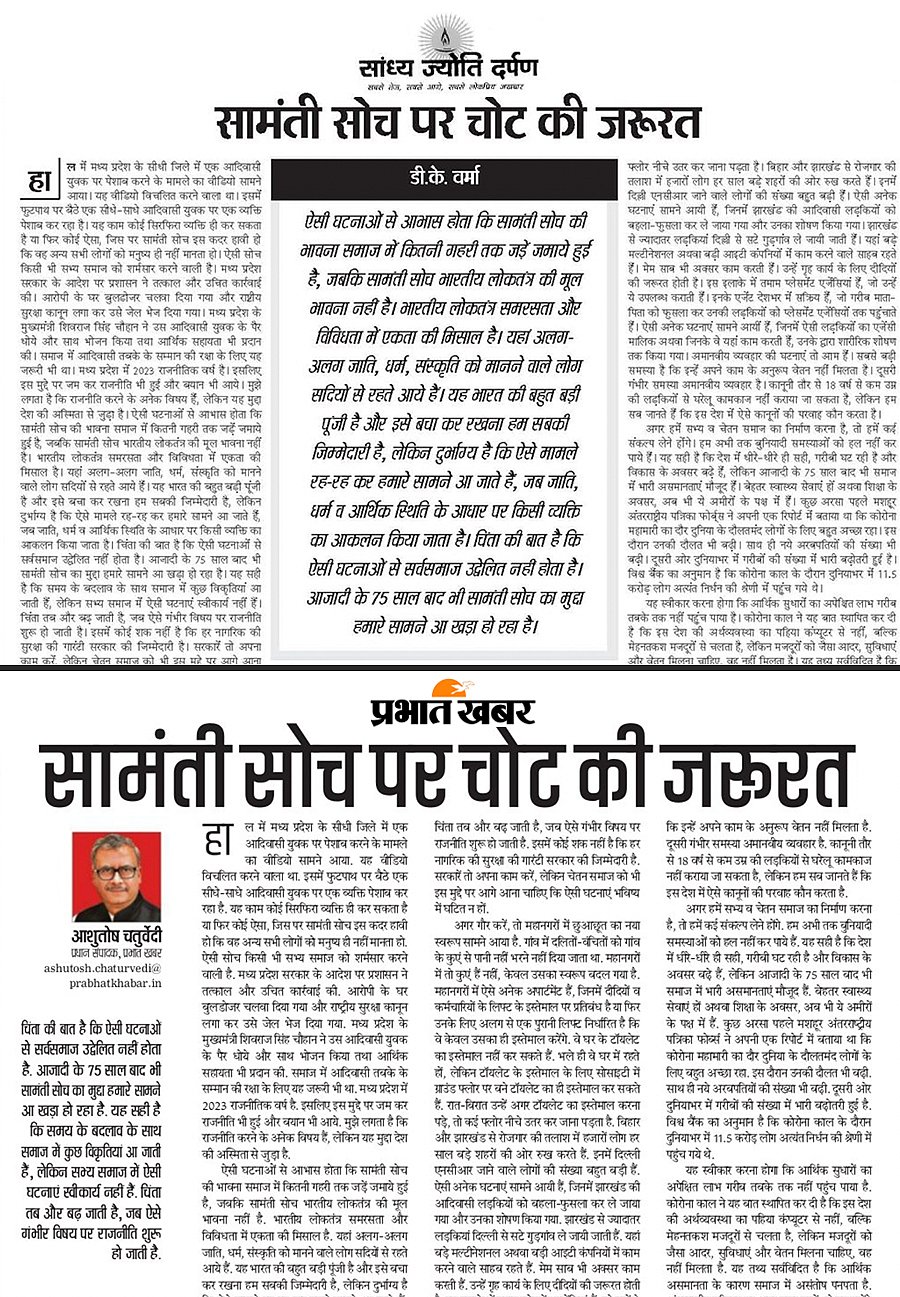
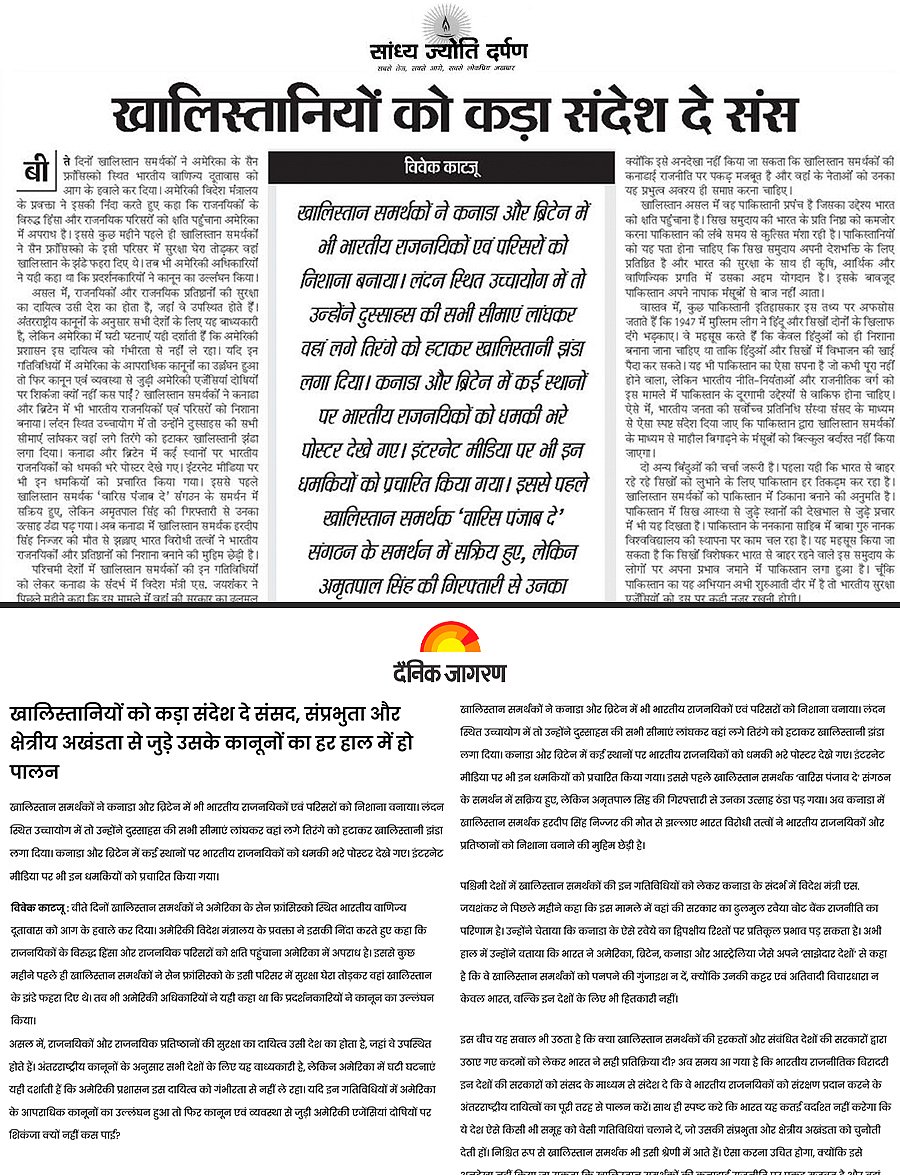
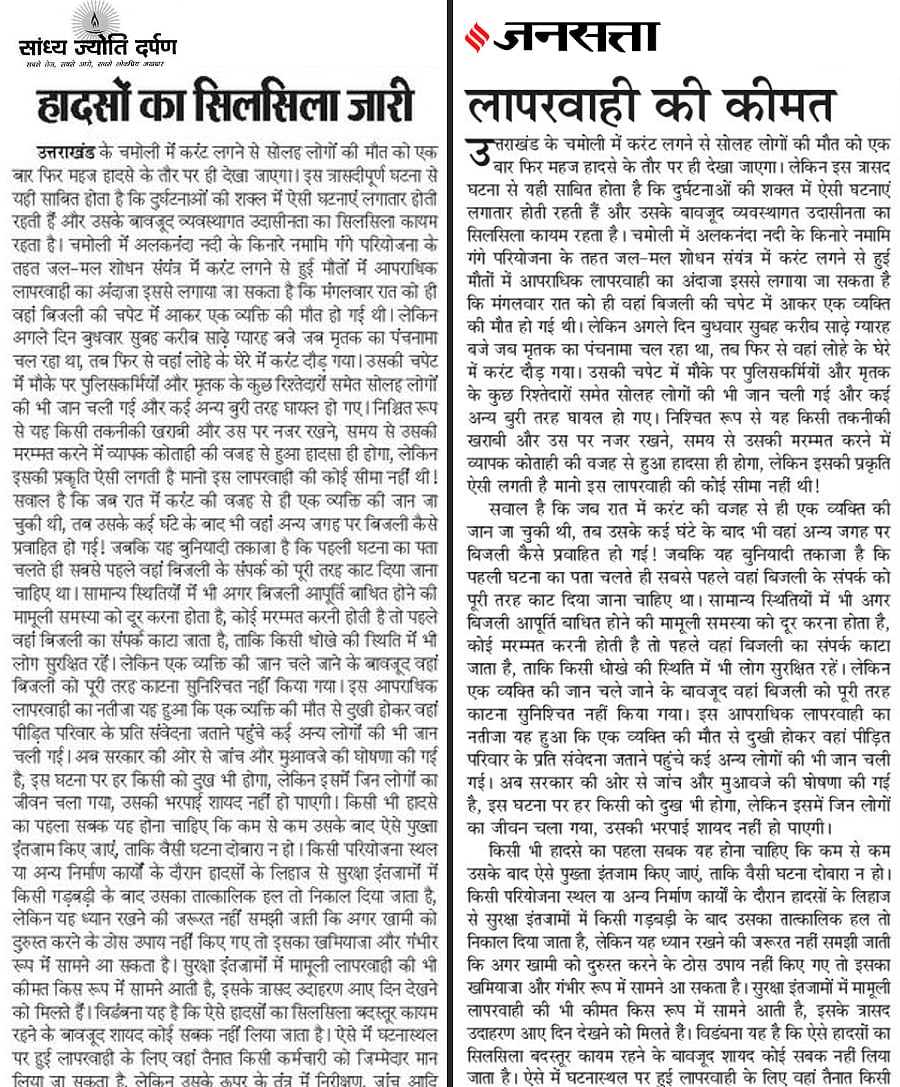
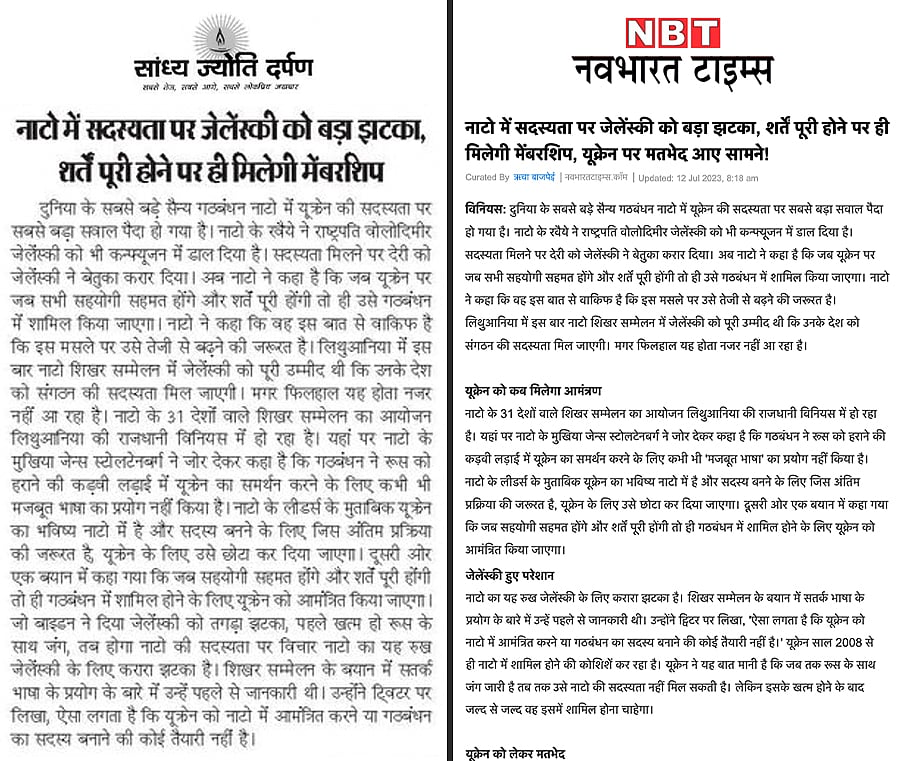
Newslaundry sent queries to JMT chief Gopal Sharma about the plagiarised articles in the newspaper. He said it did not happen to his knowledge. “I’ll look into it. If it is happening, it is wrong.”
A DAVP official told Newslaundry that the most important criteria for newspapers ads was circulation, but content also held importance, and while information on circulation was accessible, analysing the content of all the newspapers across the country was not viable.
Recently, the newspaper chief also took to the streets to protest against a minority hostel being built in Sanganer.
While the protest against the hostel was going on, the JMT published several reports on it in both its print edition and on the website. But while the newspaper did not carry Sharma’s picture or his statements from the protest, the news on the website prominently displayed his photographs from the protest with BJP leaders.
In a separate picture posted by Sharma on his social media account on April 1, Sharma stood in front of RSS founder Keshav Baliram Hedgewar’s portrait with folded hands. The caption read: “The great hero of the millennium...”
As Newslaundry asked him about his plans in politics, Sharma said: “I intend to contest elections. Who knows what will happen next?”
The videos on JMT’s social media accounts divulge the media outlet’s inclinations. Some have thumbnail texts such as ‘Politics on free electricity in Rajasthan, chief minister Gehlot scared of PM Modi’s meeting’ and ‘Long debate between Dotasara and Rajendra Pareek, Gehlot should control his ministers’. A video report published on July 8 – following the appointment of BJP office bearers for Rajasthan polls – was titled ‘BJP’s masterstroke in Rajasthan, Congress knocked out’.
A senior journalist told Newslaundry: “Mahanagar Times does lean towards the BJP, but for the fear of losing advertisements they receive from the state government, they strike a balance.”
The newspaper’s balancing act is reflected on the Facebook page of its editor-in-chief and Gopal Sharma’s son, Jigyasu Sharma. On January 26, he shared a picture of himself with BJP president JP Nadda, captioned: “Taking blessings during a private event in Jaipur organised by Mr JP Nadda, National President of BJP, Prime Minister Modi’s commander and one of the most powerful leaders of India.” Both Gopal Sharma and Jigyasu Sharma had welcomed Nadda in Jaipur on July 16.
However, in November 2019, Jigyasu Sharma had posted a similar picture with Gehlot. The caption read: “Met and got blessings from the leader of the people of Rajasthan, respected Chief Minister Shri Ashok Gehlot. I’m overwhelmed by the affection and respect received from him.” Before and after this post, Sharma has posted many pictures with Gehlot, with praise for him in the captions.
Among the local newspapers in Rajasthan, Jaipur Mahanagar Times only comes second to The Jagruk Times, run by Govind Purohit, the younger brother of Sirohi BJP leader Narayan Purohit. Newslaundry had earlier reported that The Jagruk Times too received about Rs 13 crore ads over the last nine years, and carries editorials and articles originally published in other publications.
Rashtradoot: ‘fake news’, in fierce fight with Gehlot
Established in 1952 by a freedom fighter associated with the Congress – Hazari Lal Sharma, today Rashtradoot is known for taking on chief minister Ashok Gehlot, while championing Sachin Pilot and giving space to the BJP leaders.
The publication has received central government ads worth Rs 10 crore over the last nine years, while the Gehlot-government stopped giving it ads in 2021.
In the current fiscal’s first four months, the newspaper received about Rs 23 lakh worth ads. Even though it is one of the popular newspapers, it is said to be gradually losing its sheen. While the newspaper carries original reports with bylines, its eight editions are marked by tirades that seem both personal and biased.
Some in the industry term the newspaper’s coverage “individualistic”. A senior journalist told Newslaundry: “Once upon a time Rashtradoot was the foremost newspaper of Rajasthan, but gradually it became individualistic. As you can see now, it is on Pilot’s side. When the Gehlot-Pilot dispute started, it started doing news in favour of Sachin Pilot. Many times, allegations of coercion were also made. A journalist named Renu Mittal from Delhi continuously reports in favour of Pilot.”
In October 2021, amid escalated tensions between Gehlot and Pilot, the newspaper published a series of reports against the chief minister, claiming that the Congress high command was angry with the Gehlot government. An article by Renu Mittal, published on October 19, 2021, even alleged that Gehlot had met Congress leader Rahul Gandhi to complain about the lack of political discussions, and Gandhi’s “focus on non-political issues”. The CM’s office then said that these reports by Rashtradoot were bereft of facts.
But that did not restrain the publication. Amid a series of articles in favour of Pilot, in a report published on October 29, 2021, the newspaper claimed that Pilot would be the Rajasthan chief minister by February 2022. Subsequently, the Gehlot government stopped issuing ads to the newspaper.
Chief minister Gehlot also accused Rashtradoot of “planting fake news” and urged the press council to take action against it. “Many people have emerged from Rashtradoot and have become prominent journalists. But the editor now is tearing Rashtradoot apart, and is getting it disrespected in public by planting fake news. I have given examples many times earlier… people of the state are ashamed that such a newspaper is in Rajasthan which has no relation to facts at all.”
The newspaper is led by the founder’s son Rajesh Sharma, who is the chief editor and director of the publication. There are two more directors, Rakesh Sharma and Somesh Sharma.
A senior journalist, who wanted to remain anonymous, told Newslaundry that the newspaper’s attacks against Gehlot were because of the publication’s “Brahmanical character”. “At one point, the Congress leadership in Rajasthan consisted mostly of upper castes, but that changed as Gehlot strengthened his position. Now, if the newspaper feels that anyone can challenge Gehlot, it starts publishing about them prominently. The place that Sachin Pilot is getting in this newspaper today, a few years ago Barmer Congress MP Sonaram used to get.”
In its latest offensive against Gehlot, one of the front-page reports on Rashtradoot on July 21 criticised the chief minister for the state government’s ‘Jan Samman’ video contest for promoting welfare schemes. The report by Renu Mittal underlined that the contest’s posters did not carry pictures of Congress leaders Rahul Gandhi and Sonia Gandhi and party president Mallikarjun Kharge. In a casual diatribe, the report also highlighted that the poster did not display the Congress election symbol.
It was a keen observation by Mittal, but it lay bare her oblivion towards common knowledge that a state government’s ad cannot display any party’s election symbol or its leaders’ pictures.
Newslaundry learnt that of late, the newspaper has avoided carrying the chief minister’s pictures and snubbed most of the news related to him. On July 22, the CM held a press conference, expressing his displeasure over the BJP comparing the violent incidents in Manipur to Rajasthan. The newspaper did not carry any news on the press interaction. However, it gave space to the statements of BJP leaders, including BJP state president CP Joshi and former president Satish Poonia.
On the allegations of siding with one party or leader, the publication’s director Rakesh Sharma said, “Rashtradoot is the oldest newspaper of Rajasthan. After one year of Ashok Gehlot as the chief minister, the state government stopped issuing us advertisements in 2020. The press council has also asked the government to give us advertisements, but there has been no change.”
Samachar Jagat – marginal readership, false claims, plagiarism
The newspaper, which has remained confined within the Jain community since its inception, and only publishes morning and evening Jaipur editions, has received Rs 6.75 crore worth ads from the Government of India over the past nine years.
The stream of advertisements for the newspaper, however, dwindled after the Ministry of Information Broadcasting demanded a Rs 6 lakh “recovery” in April this year for “difference in circulation”. The media outlet had reportedly falsely claimed that it published an edition in Delhi as well. It also took ads for its Delhi edition till March this year. Now, the newspaper receives ads only for its Jaipur edition.
In the first four months of the current fiscal year, ads worth Rs 10 lakh were issued to the publication.
Despite furnishing the penalty amount, the newspaper’s general manager Pawan Jain dismissed the allegations against its purported Delhi edition. “The PIB investigations happened four months after the billing. They said there was a problem with our circulation… but our circulation was fine. We were told that we had to pay the fine, so we did.”
As per the DAVP, 1,28,591 copies of Samachar Jagat’s Jaipur morning edition is circulated every day, and 16,788 copies of its evening edition are distributed per day. But some in the business allege that these figures may be inflated.
Mukesh Yadav, who heads Jagriti News Paper Agency in Jaipur, said he distributes about 1,300 copies of different newspapers in the city every day, and only gives out seven to eight copies of Samachar Jagat. “Most of these copies go to offices like Udyog Bhavan and Paryatan Bhavan. Only one or two people take it separately. These publications don’t promote themselves, how will anyone read them?”
Established by Rajendra K Godha, Samachar Jagat is now managed by his son and editor Shailendra Godha, known to toe the line of the government. A senior journalist who has been associated with a Hindi newspaper in Rajasthan for decades, said, “Samachar Jagat has never been prominent in Rajasthan. It has a good hold in the Jain community. Rajendra ji was the state president of a prominent Jain community organisation.”
The Jain community and its sages are given space in the daily publication almost every day. While the newspaper does not copy the editorials or articles verbatim from other publications, it pieces its content together by sourcing it from several publications.
For instance, the newspaper’s editorial on drugs on July 15 was a concoction of reports that appeared in different publications over the years. Parts of it were taken verbatim from a news item published in Dainik Jagran in 2012; another part was from a report published on Amar Ujala in October 2022; and the remaining was from a Punjab Kesari blog published in January this year. Most of the other news articles were press releases.
On being questioned about the plagiarism, one of the editors with the publication, who did not want to be named, said: “The one who wrote the editorial must have done something. Everyone takes references from here and there… we will talk to the person who wrote the editorial.”
Notably, the newspaper was one of those publications in Rajasthan which received subsidised land from the state government to set up its office. While the government regulations restrict such properties’ use for business related to publication, Newslaundry learnt that a part of the building has been rented out to a coaching centre.
Sandhya Jyoti Darpan: plagiarised reports, editorials
Sandhya Jyoti Darpan, the evening newspaper which has received Rs 4.16 crore worth ads over the past nine years, also has a modus operandi of carrying plagiarised reports and editorials. The newspaper with four editions – Nagaur, Alwar, Bharatpur and Jaipur – has received Rs 15 lakh worth of ads in the first four months of the current fiscal year. These include regular ads from the Rajasthan government as well.
On reviewing the newspaper’s content, Newslaundry found that on July 20, it had published an editorial on an electrocution incident in Uttarakhand’s Chamoli. The article was taken verbatim from Jansatta, which had published the editorial on the same day in the morning.
The newspaper’s editorial pages carried an article by Girishwar Mishra on the Indian education system and an opinion piece by Vivek Katju on Khalistanis on the same day. Both the articles had been originally published in Dainik Jagran a day earlier. The newspaper carried another op-ed, attributing it to “foreign newspapers”, which was also originally published in Dainik Jagran.
This was not a novel mistake. The newspaper often resorts to lifting op-eds from other publications.
On July 12, it published two editorials, one on urban planning and another on Ukrainian president Volodymyr Zelensky, both published in Navbharat Times’ morning edition on the same day.
Some of these plagiarised articles also mixed-up the bylines. The newspaper carried a report on West Bengal’s panchayat poll violence on July 12, attributing it to Prabhat Khabar editor Ashutosh Chaturvedi. But it was originally published with the byline of Jayant Ghoshal on Prabhat Khabar on July 10. Another article in the newspaper, under DK Verma’s name, was originally written by Ashutosh Chaturvedi for Prabhat Khabar’s July 10 edition.
Newslaundry found that on most days, the newspaper’s reports were either press releases or articles lifted from other publications, and even websites. On being asked about the editorials being copied verbatim from other newspapers, Sandhya Jyoti Darpan’s chief editor Mahendra Kumar Yadav said, “These employees on the desk are negligent… What to do? I’ll look into it… on many days there are no editorials, what can we do?”
Notably, like Samachar Jagat, the publication had been allotted land at subsidised rate for its office. However, the office’s top floor has been rented to the coaching institute FIITJEE for the past 10 years. Yadav said it does not violate any rules.
The publication’s previous chief editor BM Sharma is now associated with Khole Ke Hanuman temple near Jaipur as its steering committee secretary. The temple is known to be frequented by politicians and bureaucrats, including BJP’s Vasundhara Raje and Congress’ Ashok Gehlot. However, Sharma’s influence on the newspaper has remained intact with his wife Saroj Sharma and son Ajay Sharma involved in the newspaper’s management.
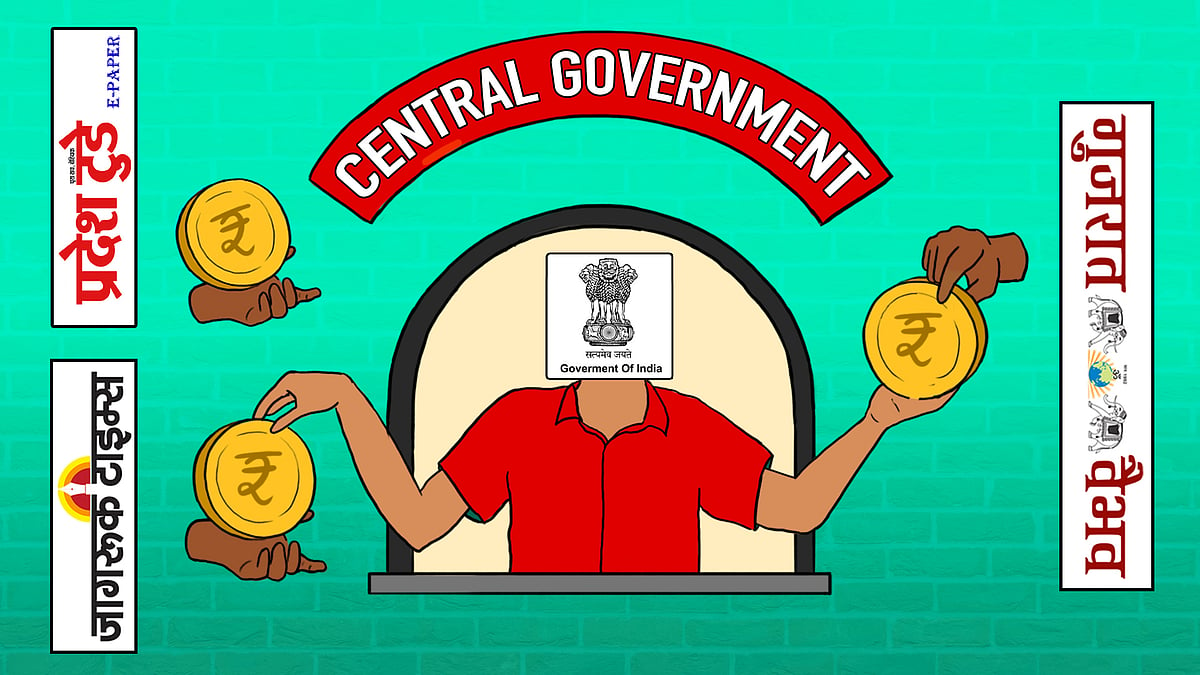 Exclusive: Small newspapers get govt ads worth crores – it’s nine years of Narendra Modi
Exclusive: Small newspapers get govt ads worth crores – it’s nine years of Narendra Modi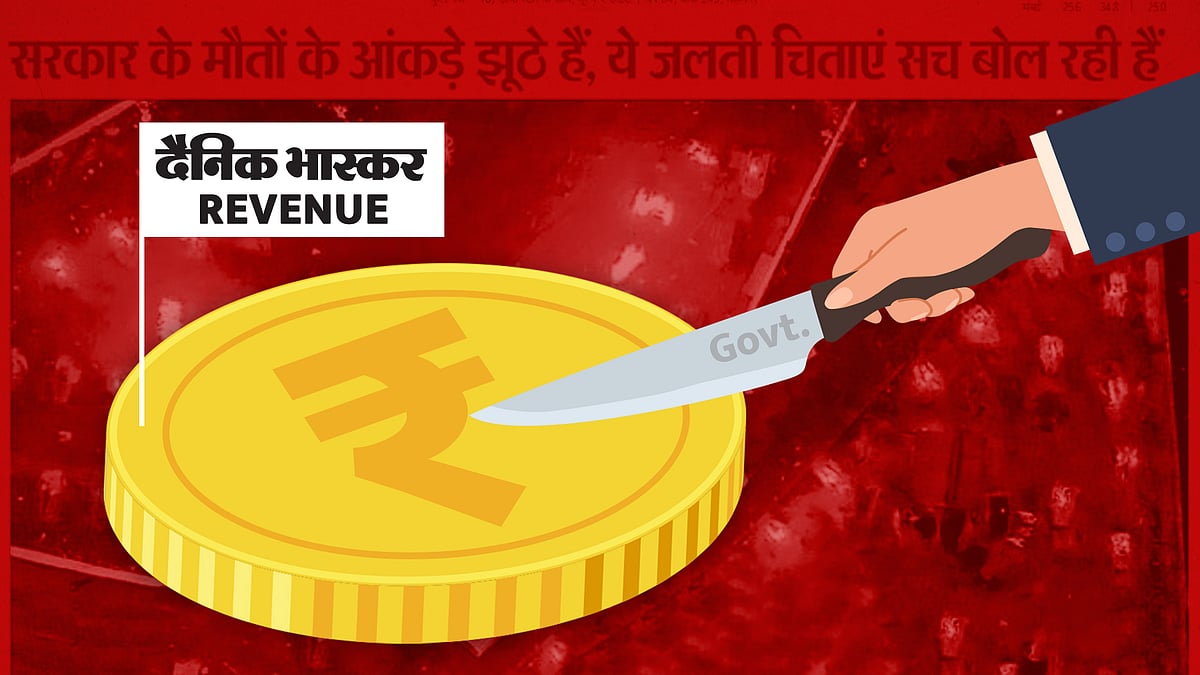 Dainik Bhaskar’s government ads halved the year it reported on Covid second wave
Dainik Bhaskar’s government ads halved the year it reported on Covid second wave